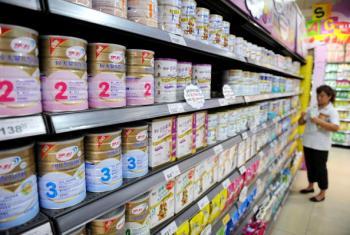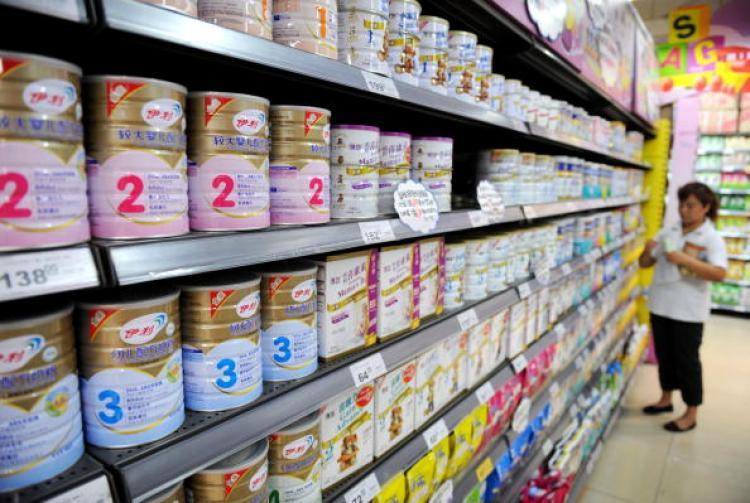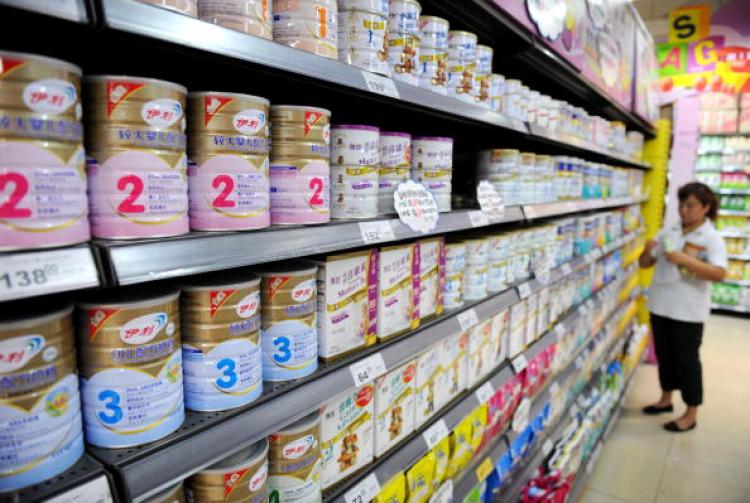The alert notice on Nov. 12 comes nearly two months after a scandal over melamine-contaminated infant formula broke in China. More than 53,000 Chinese babies have been sickened by infant formula poisoned with the chemical, an industrial polymer not meant for human consumption.
According to the FDA, melamine and melamine-analogs have been detected in a large number of products coming from China. Cyanuric acid, which forms a toxic compound when coupled with melamine, has also been detected in various products.
The affected products will be detained at border entry points until they have been tested by third-party laboratories.
The FDA has said that the extraordinary step was taken “to protect the health of the U.S. consumers.”
“Our testing has found melamine or melamine analogs in a variety of food products manufactured in China that contain milk or milk-derived components,” said Mike Herndon, an FDA Press Officer.
More than 50 milk or milk-derived products, milk-derived ingredients, and finished food products containing milk are now flagged by the FDA for possible melamine and cyanuric acid contamination. The list of products includes candy, beverages, bakery products, and baby food.
‘Step in the right direction’
“It’s a step in the right direction, but it took them two months to get to this point,” said Tony Corbo, a lobbyist with Food and Water Watch, a national consumer advocacy organization based in Washington, D.C.
Corbo says that the range of products found contaminated with melamine is also a concern.
“It seems that this whole thing is systemic, with the spiking of different food products [with melamine],” says Corbo. Melamine is added to milk or milk-derived products to make the protein level appear higher.
Corbo notes that he hopes the FDA will also start to look at other products from China, notably egg-derivatives. Recently cases of melamine-contaminated eggs and fish feed imported from China have been found in Hong Kong.
“We’ll see how long it takes them [the FDA] to deal with eggs or anything with egg products from China,” says Corbo.
Beyond Contaminated Milk
The lengthy list of types of products banned on the FDA’s import alert goes far beyond milk and milk-derivatives. The list includes animal, pet, and fish food, as well as all baby food products.
“[This is] the equivalent of trying to catch a crook by stopping everyone on the road,” says Benjamin England, a former FDA attorney, 17-year veteran of the Agency, and founder of FDAImports.com, a regulatory consulting firm.
By England’s accounting, it will take 3-4 months for backed up shipments to get released, and it is nearly impossible for a product to get off import alert.
Congresswoman Rosa L. DeLauro (CT-3), a fierce advocate on food safety issues, was also less than satisfied.
“Clearly, the problems involving melamine in China are significantly deeper than FDA would have us believe,” said Rep. DeLauro in a statement. “Based on investigative reports, it would appear that melamine trafficking in China shares similar characteristics with the illegal drug trade—underground laboratories, unscrupulous street dealers, and all of it operated by criminal syndicates.”
Testing Process Questioned
All milk products, all milk-derived ingredients, and finished food products containing milk from China will be detained until they have been tested by third-party laboratories. Importers must show through the testing that at least 5 consecutive shipments meet the minimum standard for melamine and cyanuric acid. The FDA allows 2.5 parts per million (ppm) of melamine in human food.
However, according to England, the time lag in private lab testing will create a bottleneck for products to get cleared and released.
“Private labs that do the testing [for melamine] take 4-5 weeks to get the results back,” says England.
In recent months, private labs that are equipped to test for melamine have sprung up across the U.S. However, the labs are not regulated or certified by the FDA. Due to the lack of oversight, the doctoring of results is a very real possibility. And in some instances, even when labs find contaminated products, they still get into the U.S. food stream.
In 2004, Anresco Laboratories in San Francisco found a shipment of Guatemalan snowpeas contaminated with pesticide residue. Twenty-five samples taken by the company found the snowpeas were contaminated, but due to existing laws, the importing company was free to test them at another laboratory.
“They just took their product down the street to one of our competitors, who certified they were safe,” says David Eisenberg, CEO of Anresco. Repeated attempts by Eisenberg to convince the FDA to revise its policies on third-party laboratories fell on deaf ears.
Worldwide Problems
Melamine contamination reports have been issued by more than 13 countries, including the United States and Australia and some in in Asia and Europe. The FDA has received information from foreign governments in several countries that a wide range and variety of products have been manufactured using melamine-contaminated milk or milk-derived ingredients.
Some of those products include fluid and powdered milk, yogurt, frozen desserts, biscuits, cakes and cookies, taffy-like soft candy products, chocolates, and beverages. All the product alerts received by the FDA from foreign governments were for products that originated in China.
Scandals involving imported products from China poisoned with melamine are not new. In 2007, bulk vegetable protein products imported from China appeared to have been deliberately contaminated with melamine and melamine analogs.






